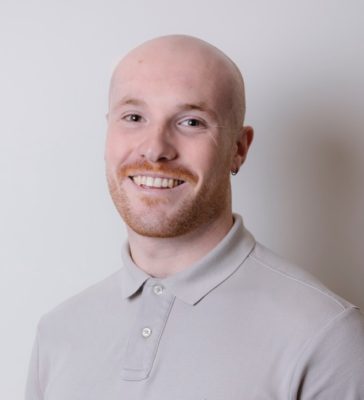
Christopher Nash
Current Employer/Organisation Name
Small Robot Company
What have you been doing since leaving Exeter, and what are you doing now?
Since leaving Exeter Uni in 2018: – Summer 2018: Internship at Small Robot Company (SRC) – Remote sensing/ Geo spatial analysis + I was given the opportunity to learn mechatronics/ Robotics/ Camera systems (all of which I use daily now). I used my Exeter Uni dissertation to get me the internship and the careers department helped me sort out my CV for my masters and indirectly to get me the internship too. – 2018/2019 MSc Agricultural Technology and Innovation at the RAU – The application of tech in Agriculture as well as a broad brushstroke of the state of the worlds agriculture systems as they stand. For my thesis I built a small robot the used NIR cameras to take images of crops to understand their health and nutrient requirements. – 2018/2019: AgriTech engineer – SRC hired me part time during my masters and full time after to progress their robot + AI capabilities. This was a mechatronics focused role which in hindsight I probably wasn’t entirely suited for but I was excited to learn and explore how engineering and remote sensing/ geospatial analysis can go hand in hand. – 2019/2021: Assistant manager @ FarmED – I got the unexpected opportunity manage a Regenerative Farm and the education centre + team that were there. i was able to control the crop rotation across the site and input systems to build farm biodiversity whilst delivering events to a wide audience (schools, academics, unis, farmers) on sustainable food production. This job swung me way back into Ag and mainly involved a lot of networking and farm management – I really enjoyed this job and made me want to become a farmer if I ever got the opportunity properly. I still help out at FarmED at the weekends in a volunteering capacity as I like the outdoor work. – 2021: Mechatronics Development Engineer @ B-hive innovations – Geospatial and data science focus in the AgTech world for delivering data insights on potato crops to farmers. Ran field trials, got commercially qualified as a drone pilot and built a robot. I took this job as I was missing the Ag-Tech aspect of my work, however the role was in Lincoln (3.5hrs from me); this wasn’t an issue initially as I was remote however as COVID restrictions relaxed I was asked to be in the office 2 days a week and I couldn’t justify the travel after a couple months of trying. – 2021 – Present Innovation Scientist/ Research Engineer @ SRC – Exploring how to further AI and robot capabilities, Blue sky thinking, Agronomy aid, Business use cases/ feasibility studies, part of the sales team, running field trials, fund bid writing and delivering presentations at external events. This opportunity came up as I was finding Lincoln hard to manage, my old boss gave me call and asked if I would consider coming back to SRC – It never hurts to leave a job on good terms as you never know if they’ll want you back!
Why did you choose this career? And what do you enjoy most about your work?
I always tried to pursue a career that enables me to learn, challenges me and enables me to explore topics that I have found interesting rather than having a direct goal/ job title for my career so far. I’ve always tried to take the opportunities when they arise and as I result I have changed jobs and been able to progress my interests further. I like where I have ended up as my day to day is never the same and I get to work across the whole company with lots of different people. I think Innovation is definitely a sector I want to stay in as I get to think about the solving problems and developing new technology a lot. Combined with Agriculture which means I get to spend a lot of time in fields and talking with people that grow the food on our plates, doesn’t make for a bad career path I think. An example week could be: – Monday: Writing a white paper for the marketing team and doing data analytics -Tuesday: Robot demo day to potential customers where I have to deliver presentations and sell robots – Wednesday: Fund bid writing / planning for a new potential bid – Thursday: Meetings with companies in USA or Chile or Netherlands over how we can use their tech on our robots – Friday: Research day on a topic that I want to explore and how we can look to solve the issues connected to it.
Please tell us if you were a member of any societies, groups or sports clubs?
GeogSoc & Volleyball Society.
What did you enjoy most about your programme and what was the biggest highlight?
The cross between Bio-science and Geography. I wasn’t much of a human geographer so when I ran out of physical geography + environmental science specific modules I was able to go to the Bio-science modules to choose. The course is nice and broad which means you can choose to specialise if you want in later years or keep it broad if you aren’t sure what you want to do and try lots of things.
What did you enjoy most about studying here?
I studied at the Cornwall Campus so my favourite part of Cornwall as the exploration outside of Uni. There was always a new beach to go to or cove to explore! Plus Gylly beach at Falmouth for an after lecture BBQ, swim or beach volleyball session was always an exciting thing to look forward to.
Why did you choose to study at Exeter?
I had heard a lot about the Uni growing up – relatives etc and the course was what I wanted to do. But the campus at Penryn, the community, the location (beaches) swung it for me.
What skills and experiences have been most useful for your career?
My most used skill from uni is the presentations and gaining the ability/ gain the confidence to speak to others with perceived confidence. I hate doing presentations but uni presentations taught me a lot about how to do them and how to present myself to others and I think that that enabled me to get my first job and have a job that involves sales now. Similar to this, the GIS skills I gained as part of my course and the academic scrutiny of researching, reviewing and then writing literature are core skills that I use on the daily.
What advice would you give to a current student who wishes to pursue your career?
The Ag sector is currently in a state of massive growth. Agriculture can help the world go beyond net zero and as a result the job market is exploding. Ag is not a sector I thought I would end up in (I thought I would be on a research ship in the Antarctica by now) and you need to be open to potential opportunities. Due to Ag also adopting new tech and ‘Big data’ AI it is also following the cliché of there will be jobs in 3yrs time that don’t exist now. But this is also providing the opportunity of anyone to enter the space as a data scientist, product manager, concept designer etc etc. What is nice as well as many of the jobs are in small companies wanting to make a name for themselves so if you are enthusiastic, want to learn and develop yourself at the same time then these companies are great places to work. Key areas to concentrate on for ag are: – Remote sensing – Biologic/ ecology of plants + countryside biodiversity – Mechatronics/ AI interests.
What are your plans for the future?
I don’t have any set plans as you never know what potential opportunity is round the corner. But the current role I am in is developing so many skills for that I would like to sit in it for a few years. Hopefully my current role will naturally progress into a Product manager or be a Head of Innovation role.

